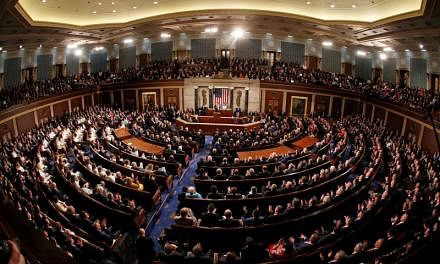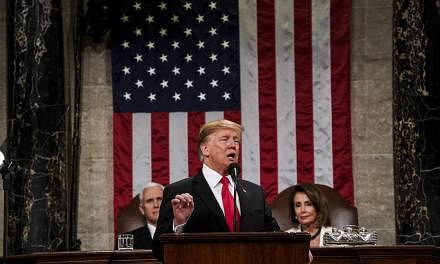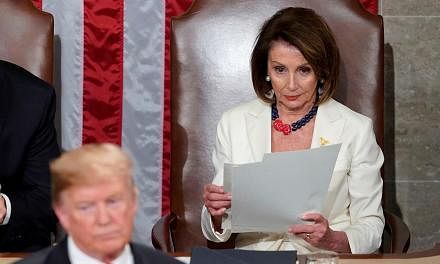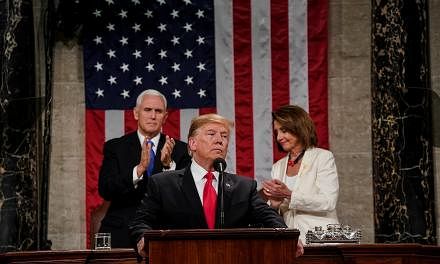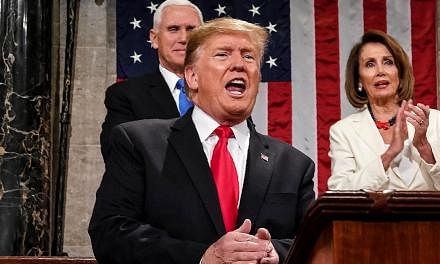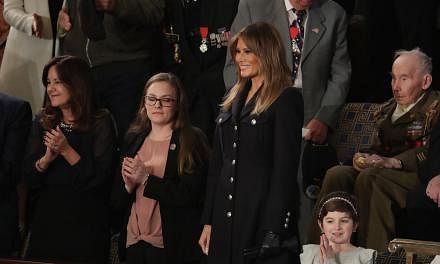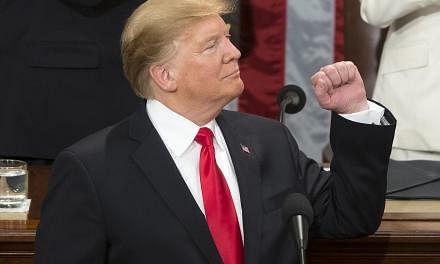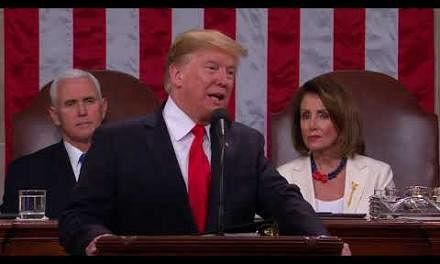WASHINGTON (WASHINGTON POST) - Former Georgia gubernatorial candidate Stacey Abrams said President Donald Trump had "abandoned not just our people but our values".
Senator Kamala Harris, a presidential candidate, dismissed his "insecure appeals to unity".
And House Speaker Nancy Pelosi offered her criticism with exasperated looks and pointed applause behind the president's back.
Emboldened by Trump's poor polling and the coming presidential campaign, Democrats firmly rejected his call for a bipartisan reset in his State of the Union address on Tuesday (Feb 5), responding with fierce criticism and a dramatically different vision for the country.
The Democratic response, at times stoic and at others defiant, amounted to a statement of strength by a party that recently took back control of the House and forced Trump to back down during a 35-day partial government shutdown he had hoped would pressure Congress to fund a new wall on the southern border.
Even before Trump began speaking, Democrats had started offering their rebuttal.
The party warned in a Tuesday afternoon tweet that the president's speech would "be filled with blatant lies and broken promises".
Senate Minority Leader Charles Schumer predicted Trump was going to just take his annual break from "364 days of the year dividing us and sowing a state of disunion".
It was a marked contrast in tone to Trump's - he delivered a speech that offered few new policies or routes to compromise but nonetheless repeatedly called on Democrats to work with him.
They rejected those appeals.
"The shutdown was a stunt engineered by the president of the United States, one that defied every tenet of fairness and abandoned not just our people but our values," said Abrams, the former Georgia state House minority leader who delivered the official Democratic response. "We know bipartisanship could craft a 21st-century immigration plan, but this administration chooses to cage children and tear families apart."
As Trump spoke, nearly a dozen declared and potential Democratic presidential candidates watched from the gallery, often unmoved during his applause lines.
All of them have made clear that they believe themselves to be better suited for bringing the country together. Unable to speak at the event, they made their views known with their invites to the chamber.
Harris brought a recent victim of the California wildfires, who had been furloughed by the shutdown.
Senator Jeff Merkley brought a young girl from Guatemala who had been separated at the border from her mother under a rescinded Trump policy.
Senator Kirsten Gillibrand brought a transgender Navy officer who could be banned from serving under a Trump order.
A few minutes into the presidential address, House Democrats offered a real-time fact check of Trump, who had arrived at the Capitol aiming to reintroduce himself as a post-partisan dealmaker.
"The agenda I will lay out this evening is not a Republican agenda or a Democrat agenda," Trump said, before listing major policy areas like healthcare prices, infrastructure and immigration. "There is a new opportunity in American politics, if only we have the courage to seize it."
As Republicans stood to applaud, the new House majority members remained in their seats, hands at their sides. The president's words, an offer that the White House had telegraphed with promises of "comity," would not come to pass. The nation's political leadership, poisoned by years of fierce disagreement, was beyond all that.
The world views of the two sides were so different, so poisoned by ill will, as to make the annual ritual of a prime-time address seem extraordinary. In a room familiar with the occasional distance between words and reality, Trump's outreach sometimes appeared less like an olive branch and more like the setup for another round of recriminations over which party is to blame for political dysfunction.
Democrats, led by Pelosi, had arrived in the chamber confident of their political position and determined to transmit their disapproval of the president and their belief that many of his words carried little meaning.
When Trump declared that the "state of our union is strong", Republicans stood and broke into "USA" chants that most Democrats did not join. Pelosi sat behind Trump and shook her head, as if in disappointment.
When Trump decried "ridiculous partisan investigations" the new Democratic House has launched, Pelosi sighed in a pantomime of exasperation.
When he called for rejecting the politics of "revenge, resistance and retribution" and embracing compromise, she stood, pointed at him and applauded loudly, as if to indict him for doing what he now decried.
The only true moment of bipartisan celebration came when Trump praised the record number of women serving in Congress. Then both sides of the chamber joined in chanting "USA".
"That's great," Trump said.
The president did little to back away from the policies he knows his opponents decry, and he returned to the same set of talking points that led to the government shutdown, which Trump has threatened to repeat in the coming weeks.
In Trump's worldview, undocumented immigrants are a top national threat, a wall on the southern border is a necessity, and the military needed to be deployed there to protect Americans from criminals on the march.
In the Democrats' view, the danger was personified by Trump's behavior in office and his racially charged efforts to divide the country. The Democratic Party warned in a Tuesday afternoon tweet that the address would "be filled with blatant lies and broken promises."
Nearly everything about the country, down to its economy, seemed in dispute on Tuesday night. For years, Republicans had argued in the Obama era that improvements in economic statistics like the unemployment rate and median wages only concealed a deeper sickness in the economy that was hurting voters.
Now Democrats argued the same, as Trump took credit for continued improvements.
"In Georgia and around the country, people are striving for a middle class where a salary truly equals economic security," Abrams said.
"But instead, families' hopes are being crushed by Republican leadership that ignores real life or just doesn't understand it."
The State of the Union address remains one of the few traditions of the presidency fully embraced by Trump, an accomplished student of televised spectacle.
Starting with his 2017 joint address to Congress, he has set aside the disruptive attitudes of his day-to-day presidency to play to the script - expressing hope, extolling unity, embracing optimism for the future.
But this time, in subtle ways, Trump seemed to acknowledge his diminished position of power after the mid-term elections. In his 2017 address to both houses of Congress, he had said "A new chapter of American greatness is now beginning."
A year later, he had declared the mission well underway.
But on Tuesday, he posed the slogan that has defined his political career more as a question - uncertain and as yet unachieved.
"The decision is ours to make," he said. "Tonight, I ask you to choose greatness."
The Democrats, quite happy with the choices they had already made, appeared as if they had not heard him. As Vice President Mike Pence rose to applaud, Pelosi flipped through her copy of the speech. Then, hesitantly, still sitting, she put down the paper and brought her hands softly together.

